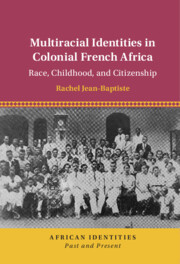Book contents
- Multiracial Identities in Colonial French Africa
- African Identities: Past and Present
- Multiracial Identities in Colonial French Africa
- Copyright page
- Contents
- Figures
- Tables
- Acknowledgments
- Introduction
- 1 Multiracial Identities and the Consolidation and Subversion of Racialized French Colonial Rule in French West Africa and French Equatorial Africa, ca. 1900–1930
- 2 Wards of the State
- 3 “I Am French”
- 4 “Odd Notions of Race”
- 5 Humanizing Maternal and Child Welfare in Dakar, 1949–1956
- 6 Multiracial Internationalism
- Epilogue
- References
- Index
1 - Multiracial Identities and the Consolidation and Subversion of Racialized French Colonial Rule in French West Africa and French Equatorial Africa, ca. 1900–1930
Published online by Cambridge University Press: 25 May 2023
- Multiracial Identities in Colonial French Africa
- African Identities: Past and Present
- Multiracial Identities in Colonial French Africa
- Copyright page
- Contents
- Figures
- Tables
- Acknowledgments
- Introduction
- 1 Multiracial Identities and the Consolidation and Subversion of Racialized French Colonial Rule in French West Africa and French Equatorial Africa, ca. 1900–1930
- 2 Wards of the State
- 3 “I Am French”
- 4 “Odd Notions of Race”
- 5 Humanizing Maternal and Child Welfare in Dakar, 1949–1956
- 6 Multiracial Internationalism
- Epilogue
- References
- Index
Summary
Chapter 1 surveys contested meanings and experiences of multiraciality in French West and Equatorial Africa, with a focus on childhood and citizenship, from the late nineteenth century to the interwar years circa 1930 – years marked by the expansion and consolidation of colonial rule. Two tropes – métis as child and métis as French citizen – influenced how métis and their maternal communities and French society grappled with the meaning of multiraciality. French colonial personnel, missionaries, settlers, jurists, and government officials in metropolitan France debated the meaning of "métis" and their social and legal status, as well as what resources should be provided for their upbringing and education by the French state and Catholic Church. People who described themselves (or children across French Africa) as métis used the term to assert their belonging and rights to French society, despite the colonial state highlighting their difference. In claiming to be French, métis individuals and kin articulated porous conceptions of race, culture, and legal status, even as the French tried to centralize colonial rule around rigid boundaries of race and culture, black and white, citizen and native.
- Type
- Chapter
- Information
- Multiracial Identities in Colonial French AfricaRace, Childhood, and Citizenship, pp. 25 - 62Publisher: Cambridge University PressPrint publication year: 2023

